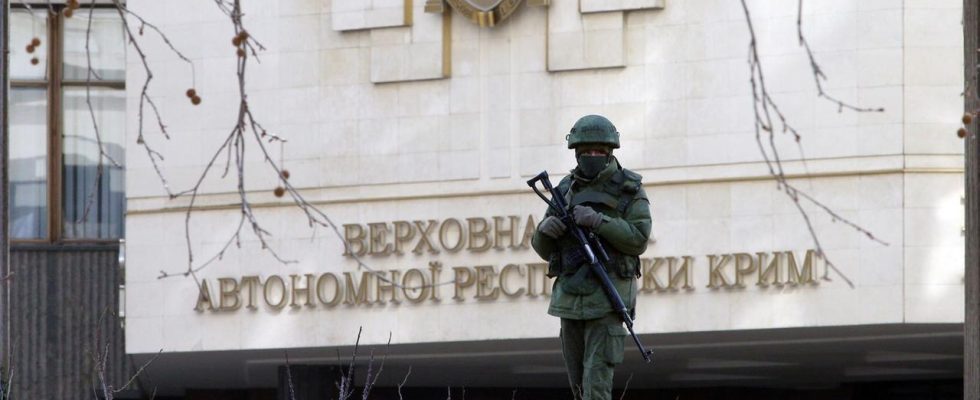Ten years ago, the government fired on those demonstrating for an independent Ukraine. Then Russia occupied Crimea and sparked a war in eastern Ukraine – eight years before the major invasion.
In February 2014, the government of corrupt President Viktor Yanukovych violently suppressed protests in the central Independence Square in the capital Kiev.
It is driving more and more Ukrainians onto the streets. As violence on the Maidan escalates, more than a hundred demonstrators are killed.
Russia denies the people of Ukraine their own will and assumes that the West is behind the protests on the Maidan. But it is Ukrainian civil society that is demanding reforms.
Russia occupies Crimea and sparks war in Donbass
While people in the capital are dying in protests for the European idea, the first Russian invasion begins in Crimea. Russian soldiers occupied the Ukrainian peninsula in the second half of February 2014.
Shortly afterwards, Russia held a mock vote there. It should show that people want to belong to Russia. With the subsequent annexation of Crimea, Russia is breaking international law.
In spring 2014, more Russian troops gathered on the eastern Ukrainian border. Russia is starting a war in Donbass with special forces, soldiers, mercenaries, weapons and heavy military equipment. While peace negotiations are taking place in the Belarusian capital Minsk, Russia is occupying parts of Ukrainian territory.
Germany, France, Ukraine and Russia sit together at the table in many rounds of negotiations in Minsk. The Russian side is not officially there as a warring party, but presents itself as a “mediator”.
At that time, Russia still denied an active role in the war and was not prepared to speak to Ukraine on an equal footing. Ceasefires are agreed again and again and broken again and again.
“Aggressors’ appetite is growing”
Today, ten years after the war began, almost 20 percent of Ukraine is occupied by Russia. “If the international community had responded consistently to the occupation of the Crimean, Luhansk and Donetsk regions, this major war simply would not have happened,” says Ukrainian human rights lawyer Oleksandra Matviychuk.
“As long as something like this goes unpunished, the aggressors’ appetites grow because they haven’t been slapped on the hands.” Matviychuk has been documenting the atrocities of the Russian army for ten years. For this work she and her Center for Civil Liberties received the Nobel Peace Prize.
Together with her Center for Civil Liberties, human rights activist Oleksandra Matwijtschuk received the Nobel Peace Prize in 2022.
Fight for legal consequences
Matwijtschuk is concerned with breaking the cycle of violence – with the help of the justice system. “We can’t wait. We have to ensure justice now. Because Russia has previously committed similar war crimes in Chechnya, Moldova, Georgia, Mali, Syria and Libya,” says the lawyer.
Russia was never punished for this. Only if some people in Russia became worried that they would be prosecuted for their actions this time, that might stop them from continuing, says Matviychuk.
This is one of the reasons why she is calling for Russia to be excluded from the UN Security Council and for an international tribunal to be established before the end of the war.
“Unity of 2014 makes Ukraine strong today”
One of the most successful artists in Ukraine is the rapper Yarmak. His personal struggle also began in 2014, he says. He felt “that it would be quite difficult and bloody.” Today he raps about the war – and fights at the front himself.
On the first day of the Russian attack in 2022, Yarmak volunteered for the army and rose to command a drone unit in just under two years. The whole world has always looked at Ukraine with a rational eye, he says.
How many troops does Russia have, how many does Ukraine have? But they didn’t take into account our confidence, our awareness and our inner courage.
He is certain: In 2014, on the Maidan, a unity was created that makes Ukraine so strong today – a new, consolidated civil society. This internal strength is largely responsible for Ukraine’s ability to defend itself so successfully against Russia’s fierce war of aggression.
The many dead and wounded
Like Yamark, many Ukrainians fight and work ceaselessly to defend their state and their freedom. Also Serhiy Ryschenko. He runs a clinic in Dnipro in eastern Ukraine. In 2014, Ryschenko saw for the first time in the operating room what war looks like and smells like.
Today he often feels like he is at the front, says the chief doctor. Every day, soldiers from all over the front are treated in his hospital and then transferred to other hospitals across the country.
Ryschenko says he has gone through ups and downs in recent years but has no doubt: “We will not give up fighting for the future of our children, even if it takes our whole lives.”
The war also means emotional wear and tear. Enduring so much death is a constant strain, and there is no end in sight. He could no longer bear the large number of wounded and dead people who came from the front and plunged him into depression. But after all these years he has gotten used to it, says Ryschenko.
Ukraine is currently losing
Ryschenko also says that developments since the Maidan ten years ago have made the population stronger. But the past two years have been grueling, and the army urgently needs new men.
Civil society is demanding that conscription become fairer. Above all, to prevent division in the country. Because many men have been fighting for more than 700 days, while others avoid the draft.
“Everyone is very tired,” says rapper and soldier Yarmak. There is a “patriotic core” that has held the front line of its own volition for two years, but they are also just people who are fighting there and many are “really tired.”
There is still a part of the Ukrainian population that can now “slowly change.” “I hope this part grows a little bit.” Yarmak calls for basic professional training for newly conscripted soldiers.
But above all, Ukraine needs the support of its Western allies. The people in the country know that. Ukraine is currently losing in the east.
There is a massive shortage of ammunition, soldiers are exhausted and urgently need to be replaced. Given this situation, it is becoming increasingly difficult for the Ukrainian soldiers to hold their own positions.


